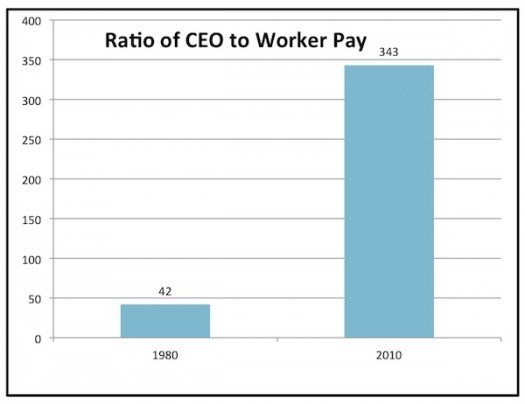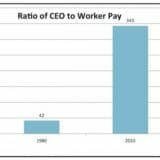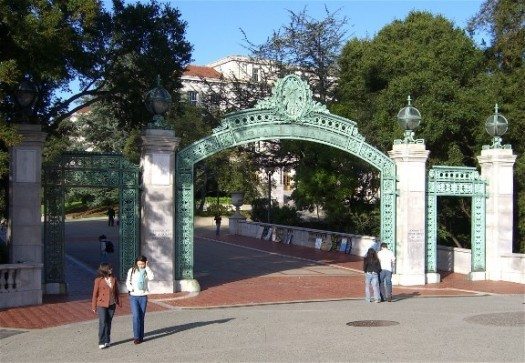Fifty years from now, when people want to know what relationships between women and men were like in 2013, they’d be well advised to watch the new Richard Linklater film, Before Midnight. This is the third installment in a film series that follows the relationship of a young French environmentalist (Julie Delpy) and an American writer (Ethan Hawke). In the first film, Before Sunrise, they meet on a train while they are in their 20s and spend a chatty, romantic night together in Vienna. In the second, Before Sunset, they reconnect nine years later in Paris as 30-somethings and rekindle the connection. And in Before Midnight, after another nine years, they are a couple with 7-year-old twins vacationing in Greece.
The first two films are dreamily romantic and enticing to watch. The beauty of the location cities is matched by the beauty of the pair’s budding relationship.


Image source: Center for Popular Economics
When Peter Drucker was writing about executive compensation in the 1970s, his purpose was to puncture some of the myths about it. Executives, Drucker pointed out at the time, weren’t getting paid as much as people seemed to think. At most companies, the ratio of CEO pay to average employee pay was less than 25-to-1, while most Americans erroneously believed it to be 50-to-1 or 100-to-1.
But that would all change in the following decades. Today, the CEOs of the largest U.S. companies make 354 times more than the average rank-and-file worker. At some companies— including Abercrombie & Fitch, CBS and Nike—the ratio is in excess of 1,000 to 1. (See this chart from Bloomberg for details.)
As far as Drucker was concerned, this sort of pay structure was absurd. “It is surely not professional altogether for people who are employees and not “owners” to pay themselves salaries and bonuses greatly in excess of what their own colleagues,


 Representative Paul Ryan is back to his old tricks, demonizing people who rely on government to improve their lives. This week, his target was food stamp recipients.
Representative Paul Ryan is back to his old tricks, demonizing people who rely on government to improve their lives. This week, his target was food stamp recipients.
He’s already come out in favor of $20 billion in cuts that will throw an estimated two million children, elderly, and disabled Americans off food stamps. But now Ryan — the millionaire Wisconsin Congressman who was Mitt Romney’s VP running mate last year — is pushing an amendment to eliminate food stamps for people who have $2,000 in savings, or a car worth more than $5,000.
The Congressional Budget Office found that this would throw 1.8 million people off of the program. The Hill reported, “Most of these would be low-income seniors and working families with children. These families typically live paycheck to paycheck. Denying them the ability to save for emergencies, such as fixing a car,


Two decades ago, this week’s report that New York University President John Sexton got a $1 million loan from the school to purchase a Fire Island vacation home would have been a national scandal. Today, it is a sign of the times. As young people graduate college facing crushing debt, college presidents, even in public schools like the University of California, are living high on the hog. NYU alone has given over 100 faculty large loans, and its former law school dean got $5.7 million for a townhouse in the West Village and a 65-acre second home in rural Litchfield County.
This disconnect between economically struggling students and privileged college presidents is deplorable. Yet school’s governance by elite-dominated boards perpetuates this staggering inequality. Activists need to find ways to prevent students from subsidizing these lavish administrator salaries, and legislation, civil disobedience and public shaming may all be necessary.
Slash Schools,
» Read more about: College Presidents Are Treated Like Wall Street CEOs »


The blowback from getting high for some people is starkly simple: Americans want drugs that ship through Mexico, and the resulting crime surrounding this commerce exacts a toll on both sides of that frontier. The devastation, of course, has been far worse in Mexico, where cartels battle each other, as well as the government and innocent citizens, in a hurricane of violence that seems to be surging out of control.
A delegation of Los Angeles writers and artists recently traveled to Mexico City and Cuernavaca for several days of dialogue about the crisis. The L.A. group, which included author and professor Rubén Martínez, playwright-activist Raquel Gutiérrez and multimedia artist Rafa Esparza, heard how Mexico’s artists face the violence of the drug war. They spoke to poet Javier Sicilia, whose son was murdered in a cartel-related crime in 2011; critic and “artivist” Mónica Mayer; singer-songwriter Leticia Servín; poets Gabriela Jáuregui and María Rivera, and journalist Daniel Hernández,
» Read more about: Death Without Borders: Art and Mexico’s Drug War »
The ripples continue to spread from Frying Pan News reporter Gary Cohn’s piece on California’s enterprise zones, which were created in 1984 to help small businesses and create jobs by giving tax breaks to companies in the state’s economically depressed regions. Last Friday the Fresno Bee called for reform of the zones and today a Los Angeles Times editorial declared that nothing less than pulling the plug on the program would do.
The zones, said the Times, “were a well-intentioned experiment that was tried, failed and has been kept around too long. This is one experiment that should be ended, not merely mended.”
Cohn’s May 28 article appeared at the same time Governor Jerry Brown was maneuvering to reform the program out of existence. The Frying Pan News story emphasized that 61 percent of the enterprise program’s beneficiaries are companies with more than $1 billion in assets,
» Read more about: L.A. Times: Pull the Plug on State’s Enterprise Zones »


Saturday, June 22, Grand Performances will present Inequality for All, a film directed by Jacob Kornbluth in which former U.S. Labor Secretary Robert Reich examines America’s widening economic gap. The documentary, part of L.A. Film Fest, screens free at 8:15 p.m., outdoors, at California Plaza. Frying Pan News reporter Luke Dowling sat down with Michael Alexander, Grand Performances’ Executive and Artistic Director, to ask about the event and Alexander’s vision for Los Angeles’ arts landscape under the city’s new mayor.
Frying Pan News: Why did you decide to include a documentary about economic inequality this season?
Michael Alexander: Documentary filmmaking is an art and some of the documentary filmmakers that we’ve worked with have also touched on the very issues that face people in their everyday lives. What are people going to decide to do for themselves?
» Read more about: Bridging Great Divides: A Talk With Michael Alexander »


How are you tonight, 7-Eleven? with your smell
of departure and annoyance, your white bread, your drain cleaners,
your puddings, your cockroaches fanning out over the parking lot
like glossy marzipan soldiers lugging fearsome shadows.
It must be lovely to watch for dawn
coming over the EverTrust Bank and the Chevron station,
it must be trying
for the lively man with the turban (sales associate #33323)
to hang out with the seven moving objects of the sky,
the eleven ounces of the heart
and the sturdy sixteen-year-olds
picking their noses by the soda fountain.
7-Eleven—benign, broad-minded firebrand of night—
the great inward journey begins with you,
inexhaustible Christmas of green red orange HELP
WANTED Do we think we understand you, 7-Eleven? How sweet
the industrious freezer, the implacable milk,
the pounds of glaze,


Walmart’s expansion strategy for Los Angeles and other urban areas has been to avoid public oversight by choosing real estate that doesn’t require public review – and, where possible, to secure public subsidies, often with little public scrutiny.
This is exactly what happened in both Covina and Cathedral City. In 1993, Walmart negotiated an intricate deal with the City of Covina’s redevelopment agency that resulted in the company making a tidy profit of $4.1 million. Walmart made a $10.8 million loan to the CRA to purchase several plots of land for the corporation, which was then sold back to Walmart at the discounted price of $6.7 million. In this way, Walmart effectively received a $4.1 million subsidy from taxpayers to develop the land. Similarly, in 1995, Walmart was reimbursed by Cathedral City for $850,000 for “infrastructure improvements,” but on the day that taxpayers recovered this subsidy,
» Read more about: Unlevel Playing Field: How Taxpayers Foot Walmart’s Bills »


 One of the biggest issues that the Affordable Care Act (ACA) is meant to tackle is the lack of health coverage among low-wage workers. While there is good news for many low-wage workers in the new law, many others will still find themselves locked out of access to affordable coverage. Solving their concerns will be one more part of the huge challenge of confronting the power of mammoth low-wage employers in the new economy.
One of the biggest issues that the Affordable Care Act (ACA) is meant to tackle is the lack of health coverage among low-wage workers. While there is good news for many low-wage workers in the new law, many others will still find themselves locked out of access to affordable coverage. Solving their concerns will be one more part of the huge challenge of confronting the power of mammoth low-wage employers in the new economy.
There has been a lot of coverage about the potential for fast food chains and other employers to cut the hours of some of their employees to under 30 a week in order to avoid having to offer them health coverage. To the extent that employers do cut back hours, it will accelerate a long trend toward part-time low wage work; part-timers increased from 17 percent to 22 percent of the workforce just from 2007 to 2011.